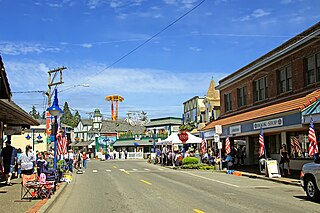
Poulsbo is a city on Liberty Bay in Kitsap County, Washington, United States. It is the smallest of the four cities in Kitsap County. The population was 11,970 at the 2020 census and an estimated 10,927 in 2018.

Lake Washington steamboats and ferries operated from about 1875 to 1951, transporting passengers, vehicles and freight across Lake Washington, a large lake to the east of Seattle, Washington. Before modern highways and bridges were built, the only means of crossing the lake, other than the traditional canoe or rowboat, was by steamboat, and, later, by ferry. While there was no easily navigable connection to Puget Sound, the Lake Washington Ship Canal now connects Lake Washington to Lake Union, and from there Puget Sound is reached by way of the Hiram M. Chittenden Locks.
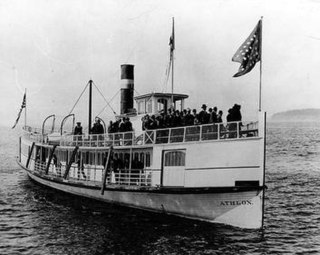
Athlon was a typical passenger steamboat of the Puget Sound Mosquito Fleet.

The Hunt Brothers were the owners of a steamboat business that ran on Puget Sound as part of the Puget Sound Mosquito Fleet. Five of the seven Hunt children became owners, engineers and masters of steamboats, these were Emmett E., Arthur M., Arda R., Lloyd.B., and Forest M. Hunt.

The steamboat Aquilo operated on Lake Washington and Puget Sound in the first part of the 20th century.

The steamboat Defiance operated in the early 1900s as part of the Puget Sound Mosquito Fleet. In later years this vessel was called Kingston.

The steamboat Dauntless operated in the early 1900s as part of the Puget Sound Mosquito Fleet.

The steamboat Monticello (2) operated in the early 1900s as part of the Puget Sound Mosquito Fleet. The vessel went through several reconstructions and remained in service until 1962, when she was lost in Alaska waters. Her later names were Penaco and Sea Venture. (This Puget Sound steamer should not be confused with the smaller Monticello, which also ran on Puget Sound, but was built in 1895 for Captain Z.J. Hatch of the Monticello Steamship Company.
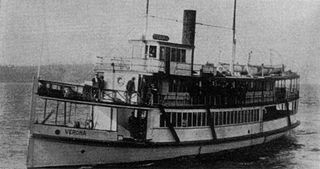
The steamship Verona was a small steamboat of the Puget Sound Mosquito Fleet.

Hyak was a wooden-hulled steamship that operated on Puget Sound from 1909 to 1941. This vessel should not be confused with the sternwheeler Hyak which ran on the extreme upper reach of the Columbia River at about the same time. The name means "swift" or "fast" in the Chinook Jargon.
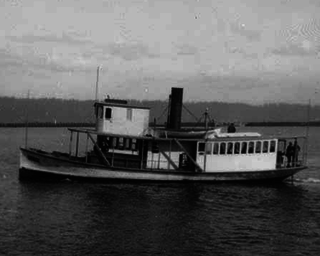
Victor was a steam-powered tugboat built in 1893 in Tacoma, Washington. This vessel should not be confused with the similarly named Victor II, also active in Puget Sound.
The Kitsap County Transportation Company was an important steamboat and ferry company that operated on Puget Sound. The company was founded in 1898 as the Hansen Transportation Company.
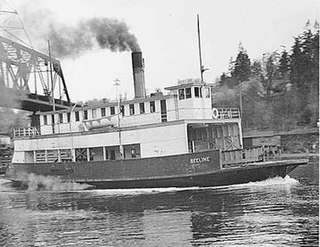
Florence K was a steamboat that was operated on Puget Sound from 1903. This vessel was later renamed Gloria and was rebuilt as a steam ferry and renamed Beeline.

Inland Flyer was a passenger steamboat that ran on Puget Sound from 1898 to 1916. From 1910 to 1916 this vessel was known as the Mohawk. The vessel is notable as the first steamer on Puget Sound to use oil fuel. Inland Flyer was one of the most famous vessels of the time on Puget Sound.

King County was a steam ferry built in 1900 which served on Lake Washington, Seattle, Washington, United States, until 1908.

Concordia was a steamboat that ran on Puget Sound from 1930 to 1976. Although later converted to diesel power, Concordia was the last inland commercial steamboat ever built on either Puget Sound or the Columbia river.

Atlanta was a steamboat built in 1908 at Houghton, Washington which served on Lake Washington and Puget Sound until 1938, when it was converted into a diesel-powered houseboat.

Suquamish, built in 1914, was the first diesel-engined passenger vessel in the United States. Much later Suquamish was converted to a commercial fishing vessel and was registered as a Canadian vessel under the name Terry.

Speeder was a motor launch built in 1908 which served on Puget Sound and in the San Juan Islands. From 1908 to 1922 this vessel was named Bainbridge.

The steamboat Acme operated on Lake Washington and also on the Sammamish Slough to Bothell, Washington from 1899 to 1910, when it was destroyed by fire.


















